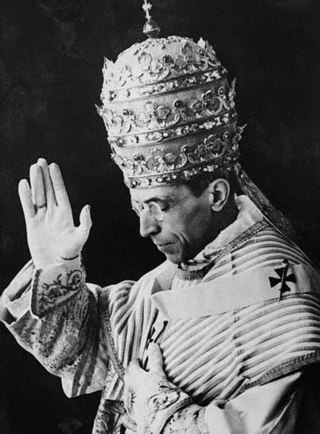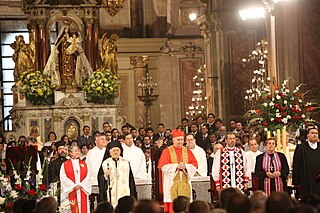Unitatis redintegratio is the Second Vatican Council's decree on ecumenism. It was passed by a vote of 2,137 to 11 of the bishops assembled at the Council, and was promulgated by Pope Paul VI on 21 November 1964.

Ecumenism – also called interdenominationalism, transdenominationalism, or ecumenicalism – is the concept and principle that Christians who belong to different Christian denominations should work together to develop closer relationships among their churches and promote Christian unity. The adjective ecumenical is thus applied to any interdenominational initiative that encourages greater cooperation and union among Christian denominations and churches.

Pope Pius XI, born Ambrogio Damiano Achille Ratti, was head of the Catholic Church from 6 February 1922 to 10 February 1939. He also became the first sovereign of Vatican City upon its creation as an independent state on 11 February 1929 where he held that position in addition to being the leader of the Catholic Church until his death in February 1939. He assumed as his papal motto "Pax Christi in Regno Christi", translated "The Peace of Christ in the Kingdom of Christ".
The Latin phrase extra Ecclesiam nulla salus is a phrase referring to a Christian doctrine about who is to receive salvation.
Quanta cura was a papal encyclical issued by Pope Pius IX on 8 December 1864. In it, he decried what he considered significant errors afflicting the modern age. These he listed in an attachment called the Syllabus of Errors, which condemned secularism and religious indifferentism.

The magisterium of the Catholic Church is the church's authority or office to give authentic interpretation of the word of God, "whether in its written form or in the form of Tradition". According to the 1992 Catechism of the Catholic Church, the task of interpretation is vested uniquely in the Pope and the bishops, though the concept has a complex history of development. Scripture and Tradition "make up a single sacred deposit of the Word of God, which is entrusted to the Church", and the magisterium is not independent of this, since "all that it proposes for belief as being divinely revealed is derived from this single deposit of faith".

Mit brennender Sorge is an encyclical of Pope Pius XI, issued during the Nazi era on 10 March 1937. Written in German, not the usual Latin, it was smuggled into Germany for fear of censorship and was read from the pulpits of all German Catholic churches on one of the Church's busiest Sundays, Palm Sunday.
Mystici Corporis Christi(The Mystical Body of Christ) is an encyclical issued by Pope Pius XII on 29 June 1943 during World War II. Its main topic is the Catholic Church as the Mystical Body of Christ.
Pascendi Dominici gregis is a papal encyclical letter, subtitled "On the Doctrines of the Modernists", promulgated by Pope Pius X on 8 September 1907.
Satis cognitum is an encyclical of Pope Leo XIII dated 29 June 1896 on the unity of the Church, and some heresies of his time.
Humani generis is a papal encyclical that Pope Pius XII promulgated on 12 August 1950 "concerning some false opinions threatening to undermine the foundations of Catholic Doctrine". It primarily discussed, the encyclical says, "new opinions" which may "originate from a reprehensible desire of novelty" and their consequences on the Church.
Indifferentism is the belief held by some that no one religion or philosophy is superior to another.

Summi Pontificatus is an encyclical of Pope Pius XII published on 20 October 1939. The encyclical is subtitled "on the unity of human society". It was the first encyclical of Pius XII and was seen as setting "a tone" for his papacy. It critiques major errors at the time, such as ideologies of racism, cultural superiority and the totalitarian state. It also sets the theological framework for future encyclical letters, such as Mystici corporis Christi (1943). The encyclical laments the destruction of Poland, denounces the Molotov–Ribbentrop Pact, and calls for a restoration of independent Poland.

The Catholic Church has engaged in the modern ecumenical movement especially since the Second Vatican Council (1962-1965) and the issuing of the decree Unitatis redintegratio and the declaration Dignitatis humanae. It was at the Council that the Pontifical Council for Promoting Christian Unity was created. Those outside of the Catholic Church were categorised as heretics or schismatics, but in many contexts today, to avoid offence, the euphemism "separated brethren" is used.
Humani generis unitas was a draft for an encyclical planned by Pope Pius XI before his death on February 10, 1939. The draft text condemned antisemitism, racism and the persecution of Jews. Because it was never issued, it is sometimes referred to as "The Hidden Encyclical" or "The Lost Encyclical". Humani generis unitas was written by three Jesuits under the leadership of John LaFarge. The draft text remained secret until published in 1995 in France and in 1997 in English as The Hidden Encyclical of Pius XI.
Mediator Dei is a papal encyclical issued by Pope Pius XII on 20 November 1947. It was the first encyclical devoted entirely to liturgy.

The theology of Pope Pius XII is reflected in his forty-one encyclicals, as well as speeches and nearly 1000 messages, during his almost 20-year pontificate. The encyclicals Mystici corporis and Mediator Dei advanced the understanding of membership and participation in the Catholic Church. The encyclical Divino afflante Spiritu began opening the door to historical-critical biblical studies. But his magisterium was far larger and is difficult to summarize. In numerous speeches Catholic teaching is related to various aspects of life, education, medicine, politics, war and peace, the life of saints, Mary, the mother of God, things eternal and temporal.

A dogma of the Catholic Church is defined as "a truth revealed by God, which the magisterium of the Church declared as binding". The Catechism of the Catholic Church states:
The Church's Magisterium asserts that it exercises the authority it holds from Christ to the fullest extent when it defines dogmas, that is, when it proposes, in a form obliging Catholics to an irrevocable adherence of faith, truths contained in divine Revelation or also when it proposes, in a definitive way, truths having a necessary connection with these.
The expression "one true church" refers to an ecclesiological position asserting that Jesus gave his authority in the Great Commission solely to a particular visible Christian institutional church—what is commonly called a denomination. This view is maintained by the Catholic Church, the Eastern Orthodox Church, the Oriental Orthodox communion, the Assyrian Church of the East, the Ancient Church of the East, the Christian Churches/Churches of Christ, the Churches of Christ, and the Lutheran Churches, as well as certain Baptists. Each of them maintains that their own specific institutional church (denomination) exclusively represents the one and only original church. The claim to the title of the "one true church" relates to the first of the Four Marks of the Church mentioned in the Nicene Creed: "one, holy, catholic, and apostolic church". As such, it also relates to claims of both catholicity and apostolic succession: asserting inheritance of the spiritual, ecclesiastical and sacramental authority and responsibility that Jesus Christ gave to the apostles.
Quanto conficiamur moerore is an encyclical of Pope Pius IX, published on August 10, 1863, addressed to the College of Cardinals and Italian Episcopate.








